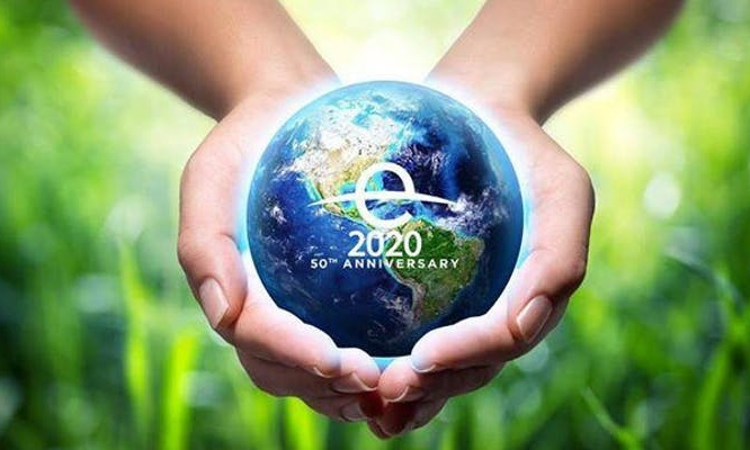Earth Day 2020: Climate Action And The Problem With "How Dare You?"
Ranu Purohit
22 April 2020 8:57 PM IST

This day marks the 50th Anniversary of Earth Day. However, it may be a first where humans are under lockdown and the environment is rejoicing. The first Earth Day was celebrated on April 22, 1970, where 20 million Americans (10% of the U.S. population at the time), took to the streets, college campuses and hundreds of cities to protest environmental ignorance and demand a new way forward for our planet.[1] It marked the beginning of a new environmental movement. It was the first Earth Day movement (a citizen's initiative) that led to the passage of landmark environmental legislations such as the Clean Air, Clean Water and Endangered Species Acts as well as the creation of the Environmental Protection Agency (EPA). In 2016, the United Nations chose Earth Day as the day to sign the Paris Climate Agreement into force.
The celebrations of Earth Day 2020, while going digital on account of COVID-19 endeavour, through the digital medium to "mobilize the world to take the most meaningful actions to make a difference.[2]" The message is clear and heartening "No matter where you are, you can make a difference. And you're not alone, because together, we can save the Earth."[3]
In India, for centuries, since the time of Indus Valley Civilization, the elements, trees and animals have been worshipped and even deified[4]. The nature is revered as 'sacred'. Rivers like Ganga and Yamuna are widely worshipped. Although the first environmental matter decided by the Supreme Court of India dealing with the issue of pollution affecting public health was in 1959[5] (dealing with environment as a facet of public health), post independence the growth of environment protection legislation can safely be credited to the Stockholm Declaration, 1972. Sweden was the first country to suggest to the United Nations Economic and Social Council (ECOSOC) in 1968 to have a conference focusing on human interaction with environment. This led to the United Nations Conference on the Human Environment at Stockholm, Sweden in 1972 where nation states agreed to abide by the Stockholm Declaration giving 26 principles concerning the environment and development.
To fulfill its international obligations under the Stockholm Declaration, the Government of India brought about the infamous Constitution (Forty-second Amendment) Act, 1976 which incorporated Article 48A and 51A(g) in the Constitution. Article 48A directs the State to endeavour to protect the environment and to safeguard the forests and wildlife of the country whereas Article 51A(g) casts a duty upon every citizen of India to protect and improve the natural environment including forests, lakes, rivers and wildlife and to have compassion for living creatures. The Declaration also brought about enactment of the Environment Protection Act, 1986 as the umbrella legislation for protection and improvement of environment.
Since then, a lot has been said and done to protect and preserve the environment. Despite plethora of legislations now holding the field such as the Air Act, Water Act, Solid Waste Management Rules, Plastic Waste management Rules etc. the environment is degrading. The Niti Aayog Report on water crisis points out that 21 major cities will run out of potable drinking water by 2021. As per the report, released in June 2018, India is undergoing the worst water crisis in its history and nearly 600 million people are facing high to extreme water stress. The report further mentions that India is placed at 120th amongst 122 countries in the water quality index, with nearly 70% of water being contaminated.[6]
When it comes to protecting and conserving the environment, we consider it as the duty of the Government and authorities. Not opining on the adequacy of steps and measures taken by the concerned environmental authorities, we as citizens ignore our responsibility to protect and conserve the environment. If there is a legitimate expectation to breathe clean air, where is the realization of consequent responsibility to keep the air clean?
To much dismay, our environmental concerns are seasonal and so is the awareness on such critical issues. With the temperatures soaring high in summers, Climate Change suddenly becomes a serious cause of concern. Reports of 'Day Zero' (with respect to availability of potable water) become relevant only when a particular city is hit by a sudden water crisis.[7] We talk of Climate Change in summers, rain water borne diseases and waste management in monsoon, crop burning and consequent air pollution in autumn, smog in winters and in spring, alas! we forget all. What is remiss is that while concern may be seasonal, care cannot be. While any endeavour for saving the environment is seemed to be for "the greater good" the shirking of responsibility to act responsibly seems to be a fatal flaw with the philosophy of "how dare you"[8]. Are we doing our share? That is the question every individual must reflect upon and not merely the question "how dare you".
In exceptional time as today, when the human community is facing a pandemic, the environment is recuperating from the century old damage. While every day we pray for the situation to improve, the oceans, rivers, wildlife and forests may be hoping for it to last a little longer to be able to replenish. The theme for Earth Day 2020 is Climate Action, its piognant; the climate is taking action for itself!
The wake up call need not always be a crisis.
Views Are Personal Only
(Ranu Purohit is an Advocate practicing before the Supreme Court of India and other Courts in Delhi. Formerly associated with the National Green Tribunal as the Legal Manager, she has a keen interest in environmental issues.)
[2] ibid
[3] ibid
[6] "Composite Water Management Index", Report published by NITI Aayog in June 2018
[7] https://www.thehindu.com/sci-tech/energy-and-environment/chennais-day-zero-its-not-just-meteorology-but-mismanagement-thats-made-the-city-run-dry/article28197491.ece
[8] https://asia.nikkei.com/Spotlight/Environment/How-dare-you-Transcript-of-Greta-Thunberg-s-UN-climate-speech Note: the speech and the consequent movement focuses on empty words and lack of concrete action by the Government as the only threat to environment.


